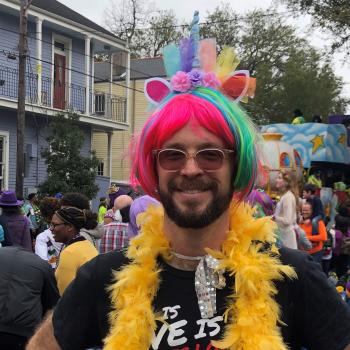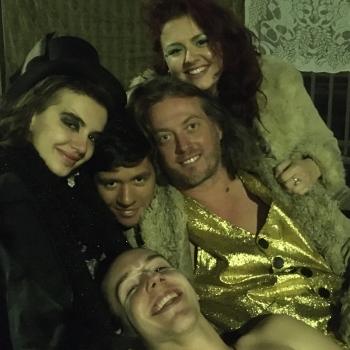I’m needing to get out some feelings and thoughts about my experience as an autistic. I was at a virtual Christian gathering this past weekend that had a high percentage of autistic and queer participants. It was a really beautiful, grounding experience even though it happened online. I don’t know how to explain this but my body knew it was safe because of what I read on the faces on the screen. Part of it was that I saw myself in the other faces. They looked as awkward as I felt and they were also comfortable so I felt comfortable.
Most importantly, I read on the other faces that no one was unnerved or disgusted by anything I was doing, even when I allowed my passion to draw me into preaching a three-minute sermon. It meant that I could actually just flow with my intuition in the conversation instead of hypervigilantly monitoring myself, which I’m realizing I’ve always had to do in neurotypical spaces for my entire life, especially with the institution that controls my legitimacy as an ordained clergyperson.
For most of my life, it’s been made clear to me by a variety of people in authority roles that I am too much to handle and I need to slow down, go away, or just stop, even though I’m not making an articulable ethical mistake with anything I’m doing. I’m simply following a neurodivergent intuition that is sharply at odds with the neurotypical norms in the space that haven’t been codified into specific concrete policies I’ve been trained to follow. I’ve learned to read other peoples’ faces very closely so I can tell the moment that I’ve lost them if I start monologuing too excitedly about a topic that I’m really passionate about or oversharing about my personal life or the other neurotypically “wrong” things I don’t feel any discomfort about doing when I lose my hypervigilance and take off my neurotypical “mask.”
I have worked very hard all my life to learn how to cut myself off quickly when I see somebody starting to roll their eyes or yawn or look at their watch. Likewise, I try to be very attentive to how strongly I’m making myself intimate right after meeting someone who seems to “get me.” There’s a stereotype about “U Haul lesbians” who move in together after they’ve been on a few dates; I’m like a “U Haul lesbian” on steroids when I meet people who seem to desire friendship with me. I have torpedoed so many first impressions by oversharing too quickly.
I can understand being attentive to the other person’s boundaries and emotional capacity. What trips me up is when someone appears to be operating outside of the norms of neurotypical anxiety and I think ooh, I can be myself with you, this is so great, I’m going all in and then it turns out that they weren’t as neurodiverse as I thought they were and/or I buried them in a supernova of intensity that would make any human uncomfortable because it felt so good to meet another suspected “weirdo” after having kept my heart to myself for a long time.
And this is where I experience continuous internal gaslighting in my head. How much do I need to figure out how to conform to social norms to help others feel safe and how much do I need to just let people go if they’re incompatible with me? I’m starting to resist the inner critic who tells me that I’m a bad person when I send someone I just met a text message that is longer than a sentence because I couldn’t figure out how to contain my excitement and they take more than a day to write me back or something about their response lets me know that their feelings about me have shifted. That used to fill me with debilitating shame.
But I’m getting to a point where I feel like saying I’m perfectly comfortable with my hurricane autistic brain and if you can’t handle that because of your neurotypical anxiety, is that my disability or yours? It just feels out of integrity for me to keep playing along with neurotypical norms and feel like it’s “moral” and “professional” for me to accommodate neurotypical sensibilities discreetly instead of having the direct conversations about boundaries that seem taboo to neurotypical discourse.
I feel like I have three options with potential friends who can’t handle my full intensity (which very few people I’ve met can handle): 1) I can stay in hypervigilant “masking” mode to play it safe so that I don’t relax and flow with my intuition which is how I accidentally volcano feelings onto people, 2) I can have a very direct, awkward conversation at the beginning of each relationship about the other person’s boundaries and capacities (which will probably make the neurotypical person walk away), or 3) I can just relax and flow with my intuition as my full queer autistic self and let people walk away if they can’t handle it.
I don’t think I’m able to follow option 1 anymore. It’s basically the autistic equivalent of staying in the closet. I tried really hard to obey neurotypical social norms for a very long time, and I honestly think that was part of the source of my ulcerative colitis. In the past year and a half that I have been fully openly autistic and queer with the world, my colitis has mostly been in remission with a few minor setbacks. I think what I’m probably going to do even if it weirds some people out is have a conversation with any potential friend who gives me their contact information about their capacity to receive communication from me just as part of that initial exchange.
If someone says please text me every time you have a poem that seems like a message from God, then I’m going to take them at their word until they say actually can you not do that. If they just ghost me, which is how many neurotypicals seem to handle the slightest social awkwardness, then that’s going to frustrate me. But if from the beginning, they say, I get anxious when I get really long text messages, then I can adapt to that just like if they’re coming over for dinner and they’re vegetarian.
It feels a lot easier to adapt when I’m responding to another person’s need than when I’m “playing it safe” and keeping my amygdala on high alert to hypercomply with unstated, suspected social norms that are not as universal, consistent, and clear as neurotypicals think they are. When I’m responding to another person’s limitations and needs, there’s no sense of shame or disability about it. Even if 98% of humans don’t want to read about someone else’s childhood trauma in a public forum, that doesn’t mean it’s morally obvious that “oversharing” content like that is wrong; it simply means that people like that, however many or few, have an emotional need that should be clarified in open conversation before I befriend them, which is of course a challenge in our day of social media “friendship.”
In my work as a psychotherapist, I try to be conscientious about seeking emotional consent from my clients before I ask them questions or make observations that might trigger them. I’ve tried my best to transfer this practice into my social interactions as well. It’s actually only been after some blowups at the beginning of the pandemic that I even discovered the concept of emotional consent. I’m not ashamed to be a lifelong learner :-).
But emotional consent is not the same thing as “I shouldn’t have to tell you what I need because it should be self-evident and it makes me anxious to have to state my needs aloud.” To me, it’s fair to say that emotional consent in relationships requires a willingness to engage in awkward, direct, specific conversations in which both parties are proactively sharing responsibility for expressing and respecting boundaries. That’s the tradeoff I’m asking for as an autistic. I want it to be normal to say what you need from the beginning rather than considering that beneath you. I’m actually thinking about piloting an improv comedy routine around this specific issue. We need a world where norms are in continuous, open negotiation instead of being presumed and unstated.
The most beautiful and courageous thing I experience in relationship is when the other person speaks up to stop me from harming them without resenting me for the fact that they had to express themselves openly. I simply want a social reality where everyone takes responsibility for articulating their needs, understanding that social anxiety is another neurodivergence that needs to be negotiated just like autism and every other neurological variance. That’s why I’ve also started alerting people to my autism at the beginning of our relationship and encouraging them to share direct feedback if I make them feel uncomfortable.
Autistic psychology professor Nick Walker argues that a true culture of neurodiversity would recognize everyone to be neurodiverse without any one perspective being privileged as neurotypical. Neurotypical society in the US is normalized around white bourgeois, capitalist (and anxiety-riddled) sensibilities about things like “professionalism,” what an “organized desk” looks like, or what an “orderly classroom” looks like to an assistant principal from the hallway. As someone who tries very hard to avoid getting called out for “unprofessionalism,”
I’m unsure that the norms of professionalism (promoted by bourgeois whiteness), in which, for example, I keep my personal emotional experience to myself, actually make for healthy, authentic relationships that result in productive teams. Often, the most effective work I have done in every career I’ve had as an activist, teacher, pastor, and counselor has been when I allowed my intuition to lead me into “unprofessional” behavior like “oversharing” or using vulgar language in a way that won another person over with my authenticity.
It seems like part of being autistic is that I am wired to chafe against norms and rules of all kinds. I also had a rebellious, salty oil man grandpa who was basically the template for my intuition of what it looks like to be a good pastor, father, human, etc. The reason I could tell my grandpa anything was because he told me dirty jokes when we were driving around on country roads when I was a teenager. So I’ve always used irreverence and “unprofessionalism” strategically as a way of helping students, parishioners, and clients feel safe around me.
My most important pastoral care and counseling tool has always been the F bomb, which of course isn’t universally applicable. I have some clients who require me to speak with more social propriety, and I can do that too. I don’t really struggle adapting to my clients. Despite the autism stereotype, I don’t experience myself to be oblivious to other peoples’ energy. I am hyperaware of it and too often paranoid about it. But in a therapeutic context, I am not accommodating the other person’s emotional foibles and anxieties as a general abdication of the validity of my social intuition. I am tending to the needs of a client whose emotional safety is the complete focus. When I’m not wrestling with an unstated social norm but tending to another human’s delicacies, I’m quite capable.
I think I work well in an environment where my colleagues recognize the benefit of having divergent intuition in their space, which I’ve experienced in my current workplace much more than any institutional church setting. I feel like at its best, my fully open autism helps carve out space for others to trust the collective grace that allows all of us to take social risks and be authentic. Somebody needs to be the first one to jump in the pool in creating a vulnerable, gracious community; I’ve never felt an emotional need to hide any secret about myself. I realize my sensibilities in this area are imperfect and in need of constant refinement. As a therapist now, I am constantly trying to make sure that my need to be myself doesn’t overrule my clients’ needs to be the focus of our therapy session. But my comfort with my autistic intuition does mean that I have little interest in doing things “by the book” out of principle beyond honoring whatever requirements I need to respect to keep my job. And I think my clients feel like they’re getting good results. Several have referred their friends to me.
So that’s where I am. I feel much better having written this. My sense of vocation has been refined by several recent experiences in which I felt unfairly pathologized by others. I want to use my own autistic experience and the experience of my autistic clients to develop a better psychotherapeutic model for understanding autism. It’s not something that needs to be “healed” by drilling neurotypical intuition into people for whom that would be completely unnatural. It’s a unique mode of interacting with reality that makes life into a beautiful, mystical, artistic adventure for the autistic who is comfortable within their own skin.
I said in a poem once that an aspie without shame is basically an X-Man. What I want more than anything is to be a Professor X in the lives of other autistics as we learn what our minds can do when they are unmasked and set free from the baggage of neurotypical anxiety. I don’t think we will be unempathetic when we are set free from taking on other peoples’ neurotypical emotional baggage as our pathology. In my experience, I have grown more proactive about tending to the needs of neurotypicals like my wife when I’m operating from a basis of accommodating someone else’s needs instead of behaving and following the unstated rules.











